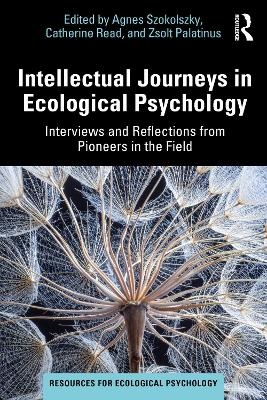
Intellectual Journeys in Ecological Psychology
Routledge (Verlag)
978-0-367-75010-7 (ISBN)
Intellectual Journeys in Ecological Psychology: Interviews and Reflections from Pioneers in the Field presents 12 in-depth interviews with prominent scientists associated with Ecological Psychology, rooted in James Gibson’s radical approach to perception.
Featuring a mix of interviews conducted around the turn of the millennium with leading figures of Ecological Psychology, the book reveals discussions not previously found in publications and authentic personal perspectives about the early days of Ecological Psychology, a significant paradigm of post-cognitivist psychology. The interviews are supplemented by current reflections that bridge the past to the present. Each interview chapter also contains a brief biography of the interviewee and a list of their top ten most significant publications. An introductory chapter by Harry Heft provides an overview of Gibson’s theory and the post-Gibsonian theoretical landscape. A further chapter by the editors highlights lineages and patterns in the scientific careers and work of the interviewees. An epilogue by William Warren concludes the volume, addressing the current state and directions of Ecological Psychology. In the Appendix photographs taken by Sverker Runeson in the 1960s and 1970s show scenes and actors from scientific event in Ecological Psychology.
This book will be beneficial to all researchers and students in the international community of Ecological Psychology. It will also serve as a starting point for those who wish to learn more about the movement and origins of Ecological Psychology.
Agnes Szokolszky received her Ph.D. at the Center for the Ecological Study of Perception and Action at the University of Connecticut, in 1996. She worked at the University of Szeged as Head of the Institute of Psychology and Head of the Cognitive and Neuropsychology Department. Her main research focus is on the Ecological Approach to metaphor and pretend play, critical thinking in psyschology, theoretical issued in cognitive science, and the history of psychology. Catherine Read received her Ph.D. in Developmental Psychology from the University of California, Los Angeles, in 1980. She has taught and conducted research at the University of North Carolina, Chapel Hill; Miami University, Ohio; the University of Connecticut, and, currently, at Rutgers University and Ithaca College. Her research has centered on the Ecological Approach to novel metaphor and on elaborating Developmental Ecological Psychology. Zsolt Palatinus received his Ph.D. at the Center for the Ecological Study of Perception and Action at the University of Connecticut, in 2013. He works at the University of Szeged in Hungary. His research focuses on multiscale interactions between the perceiver and the environment as a source of specificity in perception, action, and cognition.
1. The landmarks of the Gibsonian ecological approach to visual perception and the landscape of post-Gibsonian thought. 2. Eleanor J. Gibson – Interview and reflection. 3. Ulric Neisser – Interview and reflection. 4. Nancy deVilliers Rader – Interview and reflection. 5. Robert E. Shaw – Interview and reflection. 6. Michael Turvey – Interview and reflection. 7. William Mace – Interview and reflection. 8. Claudia Carello – Interview and reflection. 9. Reuben Baron – Interview and reflection. 10. David Lee – Interview and reflection. 11. Alan Costall – Interview and reflection. 12. Gunnar Jansson – Interview and reflection. 13. Sverker Runeson – Interview and reflection. 14. Finding and making paths in Ecological Psychology. Developmental trajectories as seen through interviews and reflections. 15. Epilogue: The Cartesian Submariner Learns to Surf. 16. Appendix: Ecological Psychology in photographs.
| Erscheinungsdatum | 12.12.2022 |
|---|---|
| Reihe/Serie | Resources for Ecological Psychology Series |
| Zusatzinfo | 1 Tables, black and white; 2 Line drawings, black and white; 29 Halftones, black and white; 31 Illustrations, black and white |
| Verlagsort | London |
| Sprache | englisch |
| Maße | 156 x 234 mm |
| Gewicht | 866 g |
| Themenwelt | Geisteswissenschaften ► Psychologie ► Allgemeine Psychologie |
| Geisteswissenschaften ► Psychologie ► Verhaltenstherapie | |
| ISBN-10 | 0-367-75010-4 / 0367750104 |
| ISBN-13 | 978-0-367-75010-7 / 9780367750107 |
| Zustand | Neuware |
| Informationen gemäß Produktsicherheitsverordnung (GPSR) | |
| Haben Sie eine Frage zum Produkt? |
aus dem Bereich


